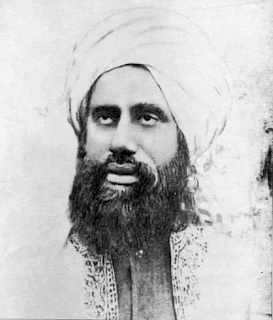The Promised Massih Hadhrat Mirza Ghulam Ahmad (as) of Qadian has had to confront his enemies all through his life. Sometimes, he invited them even to the decisive challenge of Mubahala.
In his book “Sachchai ka Izhar” (The Truth Revealed), the Promised Massih (as) made important statements of principles that are directly relevant to the current Mubahala Challenge issued by the new Massih of Allah Hadhrat Munir Ahmad Azim Sahib (atba) of Mauritius in the wake of the false allegations against him by the Ahmadi Maulvi Muhammad Ismail Sahib of Kerala.
1. On the significance of Mubahala:
In his book “Sachchai ka Izhar” (The Truth Revealed), the Promised Massih (as) made important statements of principles that are directly relevant to the current Mubahala Challenge issued by the new Massih of Allah Hadhrat Munir Ahmad Azim Sahib (atba) of Mauritius in the wake of the false allegations against him by the Ahmadi Maulvi Muhammad Ismail Sahib of Kerala.
1. On the significance of Mubahala:
“O Ye who reject me, come unto that which God and His Messenger (sa) have prescribed for the silencing of disbelievers. But if you should turn away, know that the curse of God befalls the disbelievers whose fear and retreat is testimony to their falsehood”. (p.22)
2. On Sending the Announcement of Mubahala through Registered Post
A mubahala is not a trivial business which can be entered into lightly. This matter should be decided once and for all. Thus, whosoever demurs after reading this advertisement and eschews this challenge will have no right in the future to issue a mubahala and may shamelessly call me what he wills from the shadows. Thus, to precipitate the denouement of this affair, numerous copies of this announcement will be sent by registered post so that my opponents will have no cause for excuse.” (pp.20--21)
3. Consequence of rejection of Mubahala:
“However, if any of them should baulk at taking part in the mubahala, upon reading the announcement that has been sent to them through registered post, their demurral will suffice to show that they are false and unjust in their edicts of disbelief”. (p.20).
 In the present case, the Khalifatullah openly challenged the Maulvi to accept the Mubahala duel on March 11, 2011. When the General Secretary of the Jamaat Ul Sahih Al Islam, Kerala sent him the official letter containing the Friday Sermon and the Mubahala Challenge, the Maulvi even feared to accept it and it returned back to the sender with the reason “refused”! By refusing to accept the Registered Post containing the Mubahala Challenge, sent on behalf of the Massih of Allah, Maulvi Muhammad Ismail Sahib shows that he has no cause for excuse.
In the present case, the Khalifatullah openly challenged the Maulvi to accept the Mubahala duel on March 11, 2011. When the General Secretary of the Jamaat Ul Sahih Al Islam, Kerala sent him the official letter containing the Friday Sermon and the Mubahala Challenge, the Maulvi even feared to accept it and it returned back to the sender with the reason “refused”! By refusing to accept the Registered Post containing the Mubahala Challenge, sent on behalf of the Massih of Allah, Maulvi Muhammad Ismail Sahib shows that he has no cause for excuse. To put it mildly, according to the criteria given by the Promised Massih (as), the Maulvi’s reluctance is suffice to show that he is “false and unjust” in his behaviour which prompted the Mubahala Challenge. Now, is it a mere coincidence that the book of the Promised Massih (as) is titled “The Truth Revealed”? After all, if Ahmadi Ulema were true and just, why would Allah send an Elect of His in this age?



